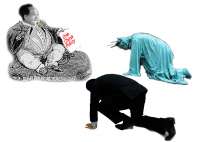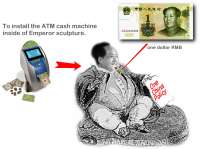KOWTOW ONE CHINA ONLY -- A LONELY EMPEROR VINCENT J.F. HUANG
When China became the world’s second best economic entity, and when financial crisis strongly wounded every other nation’s economy, China’s emergence seemed to turn it into a global political leader or a Messiah to all capitalists. The huge temptation of a 1.3 billion person market prompted the world to praise this notorious and peremptory country. China is a country which can host luxurious Olympics games but cannot feed its babies with clean milk powder; is a country which can be the second best economic entity yet cannot change the fact its people are ranked in the last 124th of GNI (gross national income) in the world; and is a country which can aggressively show off its various advanced military weapons but cannot tolerate the Nobel Peace Prize awarded to an armless writer.
Mao Zedong’s famous slogan “Serve the People” can be seen everywhere in China, yet the authority in power still wants to control and censor the internet and media information by all means, fearing the freedom of speech would trigger people to gather everyone’s complaints, and link each other through medias, possibly jeopardizing the Communist one-party dictatorship. Therefore, I use my artwork to display the true face of this country, seemingly a superpower, but in truth vulnerable and weak within its society. I intend to combine Chinese historical events to reflect the current Chinese politics.
Proposal Install a sensor and ATM machine inside the sculpture of Mao Zedong, the most famous leader in china, and when people kowtow to the sculpture, Mao Zedong’s mouth would release a note of one RMB. This is to present and imply that China uses its powerful economy to seduce and compel other countries submitting to their foreign policy. The host of the exhibition would prepare a hundred thousand RMB notes for people to interact with the sculpture and let them receive the cash.
When Britain’s King George III first sent the Ambassador, George Macartney to visit China in 1793, the first group of Ambassadors wouldn’t compromise over the courtesy and refused to “kowtow” to Chinese Emperor Ch'ien-lung. Therefore, they did not achieve the goal of establishing trading as they had hoped with their original plan.
The British returned again in 1839, this time not as ambassadors, but as a naval fleet. After the Sino-British Opium War, China entered into a weak colonial period of one hundred years. The Chinese would never forget the Sino-British Opium War, nor would the British. This term of “kowtow” has become an English word thereafter.
Over two hundred years passed since the day British ambassadors refused to kowtow to the Chinese emperor. China was the second best economic entity in the world in 2010. When financial crisis hit every country in 2008, China’s 1.3 billion person market seemingly became a path toward global salvation. Therefore, under China’s threatening and seductive superpower, many countries gradually submitted to this huge, awakening Eastern Dragon. They began to “kowtow” in various ways to Beijing authority. The French president, British Prime Minister or any other political leaders are all admitting to the Chinese government’s one China policy, in exchange for smooth trading with China.
The day before British Prime Minister Cameron visited China in November, 2010, Financial Times published an open letter to the Prime Minister from the scholar, Jonathan Fenby. The title is “Court China, Mr. Cameron, but don’t kowtow”. The word kowtow is foreign language to English, which is a translation from Chinese in accordance to the pronunciation. The British scholar uses this word to remind the Prime Minister to be aware of his speech and behaviors, which has a deep meaning, especially at the time when the Nobel Peace Prize was awarded to Liu Xioabo in Dec. 2010, and the disappeared of Ai Weiwei in April 2011.
Artist: VINCENT J.F. HUANG www.vincentjfhuang.com vincentjfhuang@gmail.com twartist@hotmail.com
KOWTOW ONE CHINA ONLY -- A LONELY EMPEROR VINCENT J.F. HUANG
When China became the world’s second best economic entity, and when financial crisis strongly wounded every other nation’s economy, China’s emergence seemed to turn it into a global political leader or a Messiah to all capitalists. The huge temptation of a 1.3 billion person market prompted the world to praise this notorious and peremptory country. China is a country which can host luxurious Olympics games but cannot feed its babies with clean milk powder; is a country which can be the second best economic entity yet cannot change the fact its people are ranked in the last 124th of GNI (gross national income) in the world; and is a country which can aggressively show off its various advanced military weapons but cannot tolerate the Nobel Peace Prize awarded to an armless writer.
Mao Zedong’s famous slogan “Serve the People” can be seen everywhere in China, yet the authority in power still wants to control and censor the internet and media information by all means, fearing the freedom of speech would trigger people to gather everyone’s complaints, and link each other through medias, possibly jeopardizing the Communist one-party dictatorship. Therefore, I use my artwork to display the true face of this country, seemingly a superpower, but in truth vulnerable and weak within its society. I intend to combine Chinese historical events to reflect the current Chinese politics.
Proposal Install a sensor and ATM machine inside the sculpture of Mao Zedong, the most famous leader in china, and when people kowtow to the sculpture, Mao Zedong’s mouth would release a note of one RMB. This is to present and imply that China uses its powerful economy to seduce and compel other countries submitting to their foreign policy. The host of the exhibition would prepare a hundred thousand RMB notes for people to interact with the sculpture and let them receive the cash.
When Britain’s King George III first sent the Ambassador, George Macartney to visit China in 1793, the first group of Ambassadors wouldn’t compromise over the courtesy and refused to “kowtow” to Chinese Emperor Ch'ien-lung. Therefore, they did not achieve the goal of establishing trading as they had hoped with their original plan.
The British returned again in 1839, this time not as ambassadors, but as a naval fleet. After the Sino-British Opium War, China entered into a weak colonial period of one hundred years. The Chinese would never forget the Sino-British Opium War, nor would the British. This term of “kowtow” has become an English word thereafter.
Over two hundred years passed since the day British ambassadors refused to kowtow to the Chinese emperor. China was the second best economic entity in the world in 2010. When financial crisis hit every country in 2008, China’s 1.3 billion person market seemingly became a path toward global salvation. Therefore, under China’s threatening and seductive superpower, many countries gradually submitted to this huge, awakening Eastern Dragon. They began to “kowtow” in various ways to Beijing authority. The French president, British Prime Minister or any other political leaders are all admitting to the Chinese government’s one China policy, in exchange for smooth trading with China.
The day before British Prime Minister Cameron visited China in November, 2010, Financial Times published an open letter to the Prime Minister from the scholar, Jonathan Fenby. The title is “Court China, Mr. Cameron, but don’t kowtow”. The word kowtow is foreign language to English, which is a translation from Chinese in accordance to the pronunciation. The British scholar uses this word to remind the Prime Minister to be aware of his speech and behaviors, which has a deep meaning, especially at the time when the Nobel Peace Prize was awarded to Liu Xioabo in Dec. 2010, and the disappeared of Ai Weiwei in April 2011.
Artist: VINCENT J.F. HUANG www.vincentjfhuang.com vincentjfhuang@gmail.com twartist@hotmail.com

